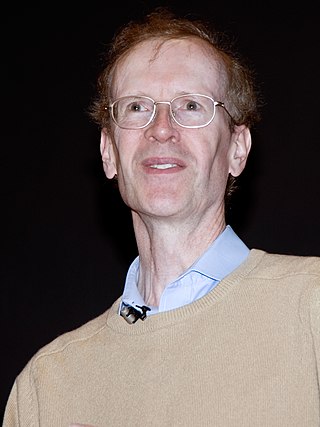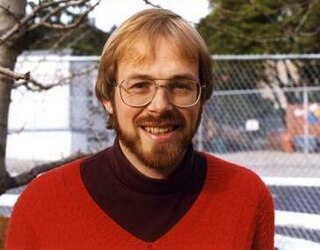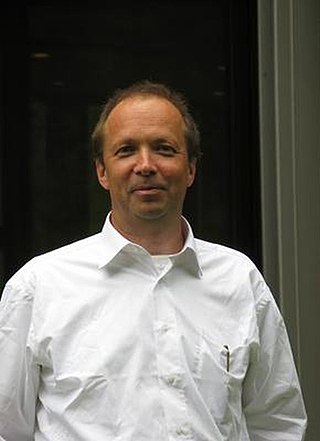
Sir Andrew John Wiles is an English mathematician and a Royal Society Research Professor at the University of Oxford, specialising in number theory. He is best known for proving Fermat's Last Theorem, for which he was awarded the 2016 Abel Prize and the 2017 Copley Medal by the Royal Society. He was appointed Knight Commander of the Order of the British Empire in 2000, and in 2018, was appointed the first Regius Professor of Mathematics at Oxford. Wiles is also a 1997 MacArthur Fellow.

David Harold Bailey is a mathematician and computer scientist. He received his B.S. in mathematics from Brigham Young University in 1972 and his Ph.D. in mathematics from Stanford University in 1976. He worked for 14 years as a computer scientist at NASA Ames Research Center, and then from 1998 to 2013 as a Senior Scientist at the Lawrence Berkeley National Laboratory. He is now retired from the Berkeley Lab.

Richard Lawrence Taylor is a British mathematician working in the field of number theory. He is currently the Barbara Kimball Browning Professor in Humanities and Sciences at Stanford University.
Jonathan Michael Borwein was a Scottish mathematician who held an appointment as Laureate Professor of mathematics at the University of Newcastle, Australia. He was a close associate of David H. Bailey, and they have been prominent public advocates of experimental mathematics.
Peter Benjamin Borwein was a Canadian mathematician and a professor at Simon Fraser University. He is known as a co-author of the paper which presented the Bailey–Borwein–Plouffe algorithm for computing π.

William Gilbert Strang is an American mathematician known for his contributions to finite element theory, the calculus of variations, wavelet analysis and linear algebra. He has made many contributions to mathematics education, including publishing mathematics textbooks. Strang was the MathWorks Professor of Mathematics at the Massachusetts Institute of Technology. He taught Linear Algebra, Computational Science, and Engineering, Learning from Data, and his lectures are freely available through MIT OpenCourseWare.

Clifford Seth Stein, a computer scientist, is a professor of industrial engineering and operations research at Columbia University in New York, NY, where he also holds an appointment in the Department of Computer Science. Stein is chair of the Industrial Engineering and Operations Research Department at Columbia University. Prior to joining Columbia, Stein was a professor at Dartmouth College in New Hampshire.
Arthur Oliver Lonsdale Atkin, who published under the name A. O. L. Atkin, was a British mathematician.

SageMath is a computer algebra system (CAS) with features covering many aspects of mathematics, including algebra, combinatorics, graph theory, group theory, differentiable manifolds, numerical analysis, number theory, calculus and statistics.
In mathematics, topological modular forms (tmf) is the name of a spectrum that describes a generalized cohomology theory. In concrete terms, for any integer n there is a topological space , and these spaces are equipped with certain maps between them, so that for any topological space X, one obtains an abelian group structure on the set of homotopy classes of continuous maps from X to . One feature that distinguishes tmf is the fact that its coefficient ring, (point), is almost the same as the graded ring of holomorphic modular forms with integral cusp expansions. Indeed, these two rings become isomorphic after inverting the primes 2 and 3, but this inversion erases a lot of torsion information in the coefficient ring.

Paul Zimmermann is a French computational mathematician, working at INRIA.

Michael Jerome Hopkins is an American mathematician known for work in algebraic topology.

Barry Charles Mazur is an American mathematician and the Gerhard Gade University Professor at Harvard University. His contributions to mathematics include his contributions to Wiles's proof of Fermat's Last Theorem in number theory, Mazur's torsion theorem in arithmetic geometry, the Mazur swindle in geometric topology, and the Mazur manifold in differential topology.
In arithmetic geometry, the Tate–Shafarevich groupШ(A/K) of an abelian variety A (or more generally a group scheme) defined over a number field K consists of the elements of the Weil–Châtelet group , where is the absolute Galois group of K, that become trivial in all of the completions of K (i.e., the real and complex completions as well as the p-adic fields obtained from K by completing with respect to all its Archimedean and non Archimedean valuations v). Thus, in terms of Galois cohomology, Ш(A/K) can be defined as

CoCalc is a web-based cloud computing (SaaS) and course management platform for computational mathematics. It supports editing of Sage worksheets, LaTeX documents and Jupyter notebooks. CoCalc runs an Ubuntu Linux environment that can be interacted with through a terminal, additionally giving access to most of the capabilities of Linux.

Jennifer Shyamala Sayaka Balakrishnan is an American mathematician known for leading a team that solved the problem of the "cursed curve", a Diophantine equation that was known for being "famously difficult". More generally, Balakrishnan specializes in algorithmic number theory and arithmetic geometry. She is the Clare Boothe Luce Associate Professor at Boston University.

Sergei Alekseevich Evdokimov was a Russian mathematician who contributed to the theory of modular forms, computational complexity theory, algebraic combinatorics and p-adic analysis.

Andrew Victor Sutherland is an American mathematician and Principal Research Scientist at the Massachusetts Institute of Technology. His research focuses on computational aspects of number theory and arithmetic geometry. He is known for his contributions to several projects involving large scale computations, including the Polymath project on bounded gaps between primes, the L-functions and Modular Forms Database, the sums of three cubes project, and the computation and classification of Sato-Tate distributions.

Sebastiaan Johan Edixhoven was a Dutch mathematician who worked in arithmetic geometry. He was a professor at University of Rennes 1 and Leiden University.














